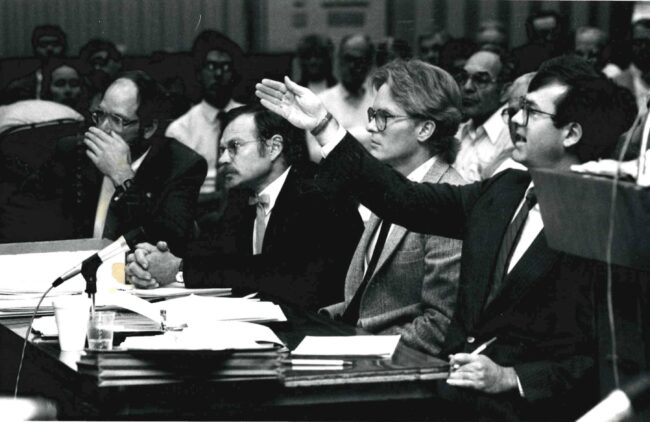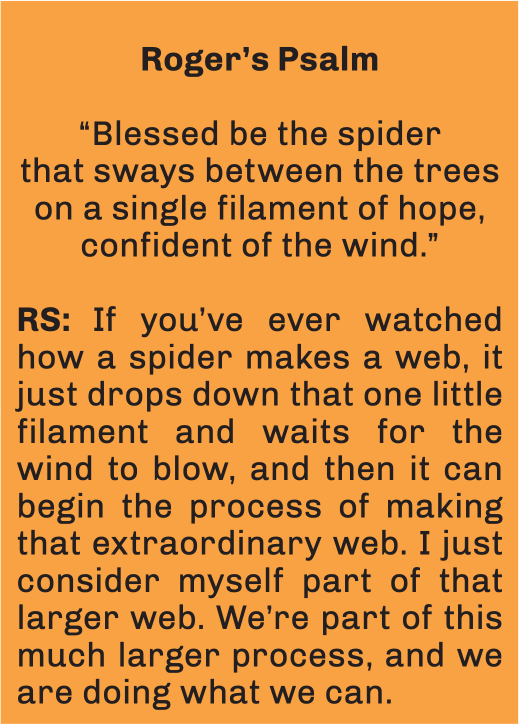By Katy Spence
MEIC is fortunate to have a number of friends and allies that we can call upon for support, encouragement, or assistance. This year, we feel especially fortunate to know our board member, mentor, and friend Roger Sullivan.
Roger has a deep history in Montana environmental law and justice. For more than 35 years, Roger has advocated for Montanans and our constitutional right to a clean and healthful environment. He has successfully represented dozens of Libby residents sickened by exposure to asbestos from the W.R. Grace mining operations. Most recently, Roger was one of the attorneys in the landmark youth climate trial Held v. State of Montana.
Roger has served on MEIC’s board multiple times and has represented MEIC and other public health and environmental groups in innumerable cases. He tirelessly advises and mentors young environmental lawyers in the state, including many of whom have worked with (or still work with) MEIC.
Here’s a conversation I had with Roger (as he was driving to Missoula to speak with environmental law students about Held and MEIC).
This conversation has been edited for brevity and clarity.
Katy Spence (KS): What does justice mean to you, Roger?
Roger Sullivan (RS): We know of justice as fairness – all of our citizens should have a fair and equal voice in forums, whether that’s legislative, administrative, or judicial. That’s really hard to do for our marginalized citizens and communities. We should also make sure that we don’t limit our concept of justice to simply the present and past; what I have really tried to interject into the decision-making process in the courts and in the Legislature is the concept of “intergenerational justice.” The decisions we are making now will have a profound impact on future generations. The science is demonstrating that this generation is consuming the quality of life for future generations, and I consider that to be an injustice that we in the present time must address. That was one of the major themes of the recent Held v. Montana trial. One of the real important parts of my practice is making myself available for the next generation of lawyers, and it’s been a great joy.
KS: Speaking of young lawyers, how did you get into environmental law?
RS: When I was a young person, there were a lot of environmental-related decisions that were being made. I started attending various public hearings and basically just doing an on-the-spot file review like, “Hand me that EA [environmental assessment]” and attempting to express some concerns. That was how I got started, and people would say, “Wow, have you ever thought of being a lawyer?” At the time, I was a carpenter and a back-to-the-lander, and it was nice to have that encouragement. I traveled down to the University of Montana Law School and got to be friends with one of the fabulous cornerstones of Montana natural resource, environmental, and Indian law, Marge Brown. We just got along so well, and Marge made every effort she could to help me figure out the [logistics]. It’s really important to have a community of support for doing these kinds of things.
 Roger Sullivan questions witnesses at the Held v. State of Montana trial in June. Photo via Roger Sullivan.
Roger Sullivan questions witnesses at the Held v. State of Montana trial in June. Photo via Roger Sullivan.
KS: Looking ahead, what do you see as the key moments or challenges facing Montana in the next few years?
RS: It’s going to be really important to communicate to all Montanans across this beautiful landscape the importance of our state Constitution. So much of the work that we’ve been doing in recent years has hinged on our ability to identify those constitutional rights that the founders created way back in 1972 but have taken really about half a century in order to breathe life into. Specifically, the right to a clean and healthful environment for this and future generations, but also for the full range of rights that are the important companions of that right. We’ve got to make sure that we’re doing our part to defend against attacks on that extraordinary and visionary document. The other challenge is to continue this process of transition. Increasingly, Montanans are becoming aware through their own experiences, their own observations on their farms and ranches, their own observations on their ski areas and in their recreational pursuits, that climate change is upon us. With that awareness, then the challenge becomes: how do we move away from the fossil fuel economy that supports so many Montanans and move into this transition process that will equally or — as Professor Jacobson pointed out in his testimony in the Held trial — even better support average Montanans, both financially as well as environmentally? There’s also a whole lot of families that rely on the extractive economy for a decent livelihood, and that’s really important to keep in mind.
KS: What advice do you have to people who are looking to make a difference, on these or other issues?
RS: One of the keys is collaboration. There’s really not an environmental issue that we’re involved in that we’re not collaborating with everyone – from the local community to concerned activists conceptualizing it into the larger policy scheme of things and working with existing groups to really find an effective coalition of advocates, whether it’s with Western Environmental Law Center or Earthjustice. It’s important to develop those relationships and coalitions because 1) it makes us much more effective, 2) it’s nice to have that kind of support and 3) it’s a whole lot more fun. We all bring different talents to this important project of making the world a better place for future generations.

KS: How do you stay hopeful in the face of the climate crisis? Do you?
RS: Oh, I’m absolutely hopeful. The way I stay hopeful is by doing what I can to participate in the large project of addressing the challenges of our time and recognizing that what I contribute is just part of a much larger project and process that takes all of us contributing our unique gifts. Remarkably, as our experts testified in the recent Held trial, there’s still time to turn this [climate crisis] around. We can do this, and I believe we must. And we might as well have a good time while we’re at it, right? It doesn’t mean we don’t try as hard as we possibly can, but it kind of lightens the load, and I do think the world will ultimately be a better place for it. And it’s not just because of us, but because of that larger movement of which we’re a part.
This article was published in the December 2023 issue of Down To Earth.

